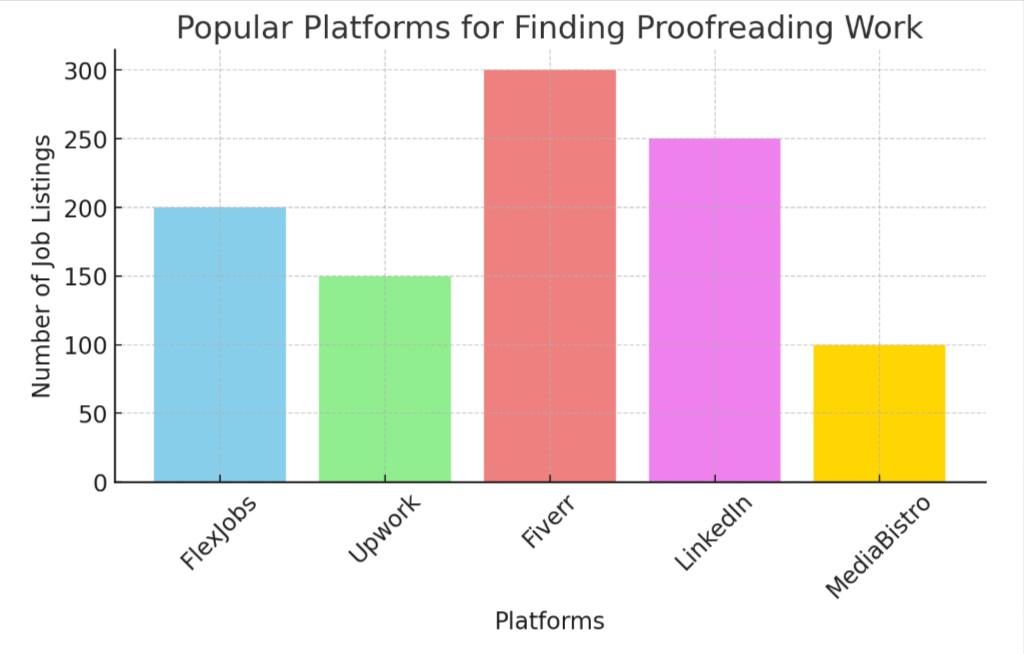Launch Your Freelance Career: Tips for Remote Proofreading Success
Are you tired of the daily commute and looking to tap into remote work? Believe it or not, there’s a high demand for proofreading jobs that let you work from anywhere. This blog will guide you through finding online proofreading gigs, boosting your skills, and launching your freelance career.
Let’s dive in and turn those proofreading dreams into reality!
Key Takeaways
- Remote proofreading jobs allow you to work from anywhere with just a computer and internet access.
- Essential skills for remote proofreaders include a keen eye for detail, strong language command, and understanding of different writing styles.
- Online job boards like FlexJobs, Upwork, Fiverr, LinkedIn, and MediaBistro are great places to find freelance proofreading work.
- Networking with industry professionals and creating a solid portfolio can increase your chances of getting remote proofreading gigs.
- Success in the field requires effective time management, setting up a business structure for freelancing, marketing your services strategically, and collaborating well with others.
What Are Online Proofreading Jobs?
Online proofreading jobs involve meticulously reviewing text to correct typos, grammar errors, and spelling mistakes. Proofreaders work with various documents like blog posts, articles, books, and more.
They ensure that the final piece is polished and free of errors before publication. This role is crucial because even the smallest mistake can change a message’s meaning or reduce its professionalism.
The demand for these positions has grown with the rise of remote work. Freelance proofreading opportunities allow individuals to work from anywhere as long as they have a computer and internet access.
Many proofreading roles are flexible, making them ideal for people looking for part-time remote proofreading roles or entry-level proofreading jobs from home. With plenty of online editing gigs available on platforms like FlexJobs or Upwork, anyone interested in freelancing can find freelance editing work that suits their schedule and skill level.
Skills & Training for Remote Proofreaders
To thrive in remote proofreading jobs, you need a sharp eye for detail and exceptional command of language. These core skills ensure that every comma is correctly placed and each sentence flows smoothly.
You must also understand different writing styles and editorial guidelines since freelance proofreading opportunities often require versatility across various formats and genres. A robust grasp on grammar, punctuation, spelling, and syntax can’t be overstated; it’s what sets professional proofreaders apart from novices.
Building your skillset might involve taking specific courses in editing or even earning a degree related to English or journalism if you’re just starting out. There are plenty of online training programs designed to bolster your ability to spot errors and improve texts effectively.
Investing time in certifications such as the Editing Certificate from Poynter ACES Certificate in Editing or completing coursework through platforms like Coursera can pay off by making you more attractive to clients seeking top-notch remote editing jobs for beginners without experience.
Continuous learning keeps you updated with changing linguistic trends and editorial standards which are crucial for maintaining excellence in this line of work.
Finding Remote Proofreading Jobs
Utilize job boards and platforms like FlexJobs, Upwork, Fiverr, LinkedIn, and MediaBistro to search for remote proofreading opportunities, network with professionals in the industry to get referrals, and build a strong portfolio of work to showcase your skills.
Read more about how you can find these exciting remote opportunities!
Job boards/platforms (FlexJobs, Upwork, Fiverr, LinkedIn, MediaBistro)
Landing remote proofreading jobs can kick-start your freelance editing career. Online job boards and platforms provide a wide array of freelance proofreading opportunities for both experienced editors and newcomers.
- FlexJobs caters to those seeking professional remote work, including remote editing positions. They vet their listings, ensuring you find legitimate and flexible proofreading opportunities.
- Upwork operates as a global freelancing platform where you can create a profile to showcase your proofreading skills. Clients post various online editing gigs, allowing you to submit proposals for the projects that suit you best.
- Fiverr offers an approach where freelancers post services they offer, including virtual proofreading jobs. You can set up packages detailing your part-time remote proofreading roles at different price points.
- LinkedIn isn’t just for networking; it’s also valuable for finding remote editing jobs. Update your profile with your proofreading expertise and use the job search feature to find companies looking for freelance editors.
- MediaBistro is tailored specifically for media professionals and lists numerous online proofreading jobs for beginners to experts. They are an excellent source of remote work in the writing and editing industry.
Networking and referrals
After leveraging job boards and platforms to find remote proofreading opportunities, it’s essential to harness the power of networking and referrals. Building connections within the editing and writing communities can lead to valuable referrals for freelance gigs.
Joining online forums, engaging with professional organizations on social media, attending virtual industry events, and reaching out to colleagues can provide access to a network of potential clients or collaborators.
Establishing strong relationships within the industry is key in securing ongoing freelance proofreading work.
Expanding your referral network beyond direct contacts may also involve seeking recommendations from satisfied clients or connecting with other freelancers who may refer overflow work when they’re at capacity.
Building a portfolio
To build a portfolio as a remote proofreader, consider the following key steps:
- Showcase diverse proofreading projects in your portfolio that display different styles and topics.
- Include samples that highlight your ability to edit for grammar, punctuation, consistency, and overall clarity.
- Demonstrate your expertise by including before-and-after examples of documents you’ve proofread.
- Add testimonials from satisfied clients or colleagues to validate your skills and professionalism.
- Update your portfolio regularly with new work and remove outdated or weaker samples to present your best work consistently.
- Create an online platform to showcase your portfolio, making it easily accessible for potential clients to view.
- Tailor your portfolio to reflect the specific niche or industry you are targeting, presenting relevant examples that align with the desired market.
Tips for Success as a Remote Proofreader
When it comes to success as a remote proofreader, managing your time and workflow is essential. Setting up a freelance business, marketing your services, collaborating with other proofreaders, and overcoming potential challenges are all key factors to consider.
Managing time and workflow
To manage time and workflow effectively in remote proofreading jobs, consider the following:
- Create a schedule that includes dedicated time for proofreading tasks and breaks to maintain focus and productivity.
- Prioritize projects based on deadlines, complexity, and client requirements to ensure efficient time management.
- Utilize project management tools such as Trello or Asana to organize tasks, set deadlines, and track progress.
- Minimize distractions by working in a quiet environment and setting boundaries with family members or housemates.
- Implement effective communication with clients to clarify expectations, receive feedback promptly, and avoid misunderstandings that could impact workflow.
- Regularly review your workflow processes to identify areas for improvement and optimize efficiency.
Setting up a freelance business
Transitioning from managing time and workflow to setting up a freelance business, it’s essential for remote proofreaders to establish a strong foundation. Begin by registering your freelance business with the appropriate local authorities.
Next, create a professional website or portfolio showcasing your skills and services. Utilize social media platforms and professional networks to promote your proofreading expertise, enhancing visibility in the competitive online market.
Additionally, consider setting up an efficient invoicing system and defining clear terms of service for clients.
Marketing your services
To market your proofreading services effectively, use these strategies:
- Create a professional website showcasing your expertise and offering client testimonials.
- Utilize social media platforms like LinkedIn, Twitter, and Facebook to connect with potential clients and share valuable content related to proofreading.
- Network within writing and editing communities to build relationships and generate referrals.
- Offer free sample edits to potential clients to showcase your skills and gain their trust.
- Collaborate with other freelancers or agencies in the industry to expand your reach and provide complementary services.
Collaborating with other proofreaders
Collaborating with other proofreaders can be beneficial for sharing tips and strategies, discussing best practices, and staying updated on industry trends. Joining online communities or forums focused on proofreading allows you to connect with peers, seek advice, and potentially find collaboration opportunities.
Working together with other proofreaders can provide a supportive network as well as exposure to different perspectives and approaches in the field.
Considering that remote work can sometimes feel isolating, engaging with other proofreaders virtually through social media groups or professional networks like LinkedIn can offer valuable connections and foster a sense of community within this freelance niche.
Having access to a pool of fellow professionals also opens up possibilities for peer reviews and constructive feedback, which are essential components for continuous improvement in the world of remote proofreading gigs.

Potential challenges and how to overcome them
Collaborating with other proofreaders can bring its own set of challenges, but being aware of them and knowing how to overcome such obstacles is crucial for success. Here are some potential challenges you may encounter as a remote proofreader and how to overcome them:
- Managing different work styles can be challenging, but setting clear expectations and communication channels from the start can help minimize misunderstandings and ensure smooth collaboration.
- Maintaining consistency across multiple projects might be difficult, but creating style guides or using tools like Grammarly Premium can help maintain uniformity in the final deliverables.
- Dealing with time zone differences may lead to coordination issues, but leveraging scheduling tools like Doodle or Calendly can streamline meeting arrangements and avoid confusion.
- Resolving disagreements on edits and suggestions might occur, but establishing a professional approach to giving and receiving constructive feedback is essential for maintaining positive working relationships.
- Balancing workload distribution among collaborators could pose a challenge, yet utilizing project management platforms such as Trello or Asana can provide transparency and accountability in task allocation.
- Overcoming technical hurdles while collaborating virtually is essential; fostering a culture of continuous learning and regular tech check-ins can ensure everyone remains updated with the latest digital tools and platforms.
- Navigating cultural differences if working with international collaborators requires sensitivity, understanding, and an open-minded approach to enhance cross-cultural communication for efficient teamwork.
Conclusion
In conclusion, remote proofreading jobs offer flexible opportunities for aspiring freelancers. Building a strong portfolio and leveraging online platforms can help in finding remote proofreading gigs.
Managing time effectively, setting up a freelance business, and marketing services are crucial to success as a remote proofreader. Overcoming potential challenges by networking with other professionals in the field is essential for growth in this industry.

